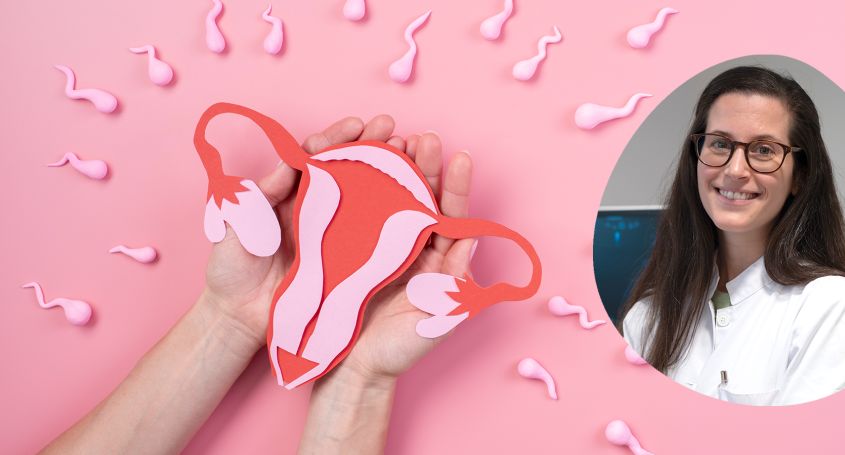Interview with Dr. Alejandra Casas
Polycystic ovarian syndrome (PCOS) is one of the leading causes of ovulation disorders and can pose a challenge for many women seeking to become pregnant. This hormonal disorder not only affects fertility but can also influence metabolic health and overall well-being. However, with proper diagnosis and a personalized approach, it is possible to improve the chances of conceiving.
For a better understanding on how PCOS impacts fertility and what strategies can help those who suffer from it, we spoke with Dr. Alejandra Casas, a gynecologist specializing in fertility and assisted reproduction . In this interview, we discuss key symptoms, the relationship with insulin resistance, and the options available to women who wish to become mothers.
1. What is polycystic ovarian syndrome (PCOS) and how does it affect fertility?
Polycystic ovary syndrome (PCOS) is the most common endocrine disorder in women of reproductive age. It is mainly characterized by hormonal changes that can cause acne, excess body hair, hair loss, cycle disorders such as anovulation, and polycystic ovarian morphology on ultrasound, presenting 12 or more follicles between 2 and 10 mm. It is important to note that not all women with PCOS have all these symptoms, and that the intensity of these symptoms can vary from person to person.
PCOS affects fertility mainly by causing chronic anovulation, meaning that the ovaries do not release eggs. This results in irregular menstrual cycles and difficulty conceiving due to the inability to predict ovulation. In addition, alterations in the microenvironment of the follicles due to a pro-inflammatory state and oxidative stress, caused by hormonal imbalance, can compromise egg quality and embryo development.
In summary, PCOS is a leading cause of anovulatory infertility and can affect egg quality and, therefore, the pursuit of pregnancy, requiring a personalized approach to optimize reproductive outcomes.
2. What are the main symptoms of PCOS that women should be aware of?
The main symptoms of PCOS that women should be aware of include menstrual irregularities, hyperandrogenism, and insulin resistance, among others.
When we talk about the menstrual cycle, a regular cycle is considered to be between 21 and 35 days, and an irregular cycle could be caused by the absence of ovulation.
Another of the symptoms mentioned above is hyperandrogenism, which is an excess of male hormones. It manifests itself through the presence of acne, excess hair in places such as the chin, abdomen, and back, and androgenic alopecia, hair loss or thinning on the top of the head.
In some cases, secondary infertility due to chronic anovulation can be identified as a symptom.
In addition to the main symptoms of PCOS, some patients may have insulin resistance. This can manifest itself with signs such as acanthosis nigricans, which are areas of dark, thickened skin, especially in folds such as the neck, armpits, groin, or elbows. Central obesity or difficulty losing weight is also common.
3. How does PCOS affect ovulation, and what can be done to improve fertility in women with this syndrome?
As I explained earlier, PCOS causes chronic anovulation, which is the leading cause of infertility in these patients. Initial management to improve fertility includes lifestyle modifications such as weight loss and regular exercise, which can restore ovulation in many patients. If lifestyle changes are not sufficient, ovulation induction with drugs such as letrozole (aromatase inhibitor) is necessary. This is the first-line treatment in women who wish to become pregnant, followed by clomiphene or gonadotropins if there is no response. Metformin is a drug that can be used in PCOS patients with insulin resistance.
4. What role does insulin resistance play in PCOS and how can it affect fertility?
One of the key aspects of PCOS is insulin resistance. This means that the body does not respond well to insulin, a hormone that helps control blood sugar. As a result, the body produces more insulin than normal. This elevated insulin has several negative effects, such as stimulating the ovaries to produce more male hormones (androgens), thus hindering ovulation, a key factor in getting pregnant. Insulin resistance also increases the risk of developing other diseases, such as type 2 diabetes and cardiovascular problems, so it is important to diagnose and treat it. The main strategies for improving insulin resistance and fertility in PCOS include, as we have already mentioned, lifestyle changes such as a healthy diet and regular exercise. In some cases, medications that help improve insulin sensitivity, such as metformin, are required.
5. What advice would you give to women with PCOS who are trying to conceive?
First and foremost, maintain a healthy lifestyle. Eat a balanced diet, exercise regularly, and avoid excessive weight gain. Avoiding smoking and reducing alcohol consumption can also improve fertility and reduce risks during pregnancy.
Another key factor to consider is managing chronic diseases. It is important that conditions such as diabetes and hypertension are well controlled before trying to conceive, as they can increase risks during pregnancy.
It is also important to remember that it is crucial to start taking folic acid supplements before trying to conceive to prevent neural tube defects in the baby. In some cases, if the patient is obese, it may be necessary to supplement with a higher dose of folic acid.
In cases where, despite all lifestyle changes, ovulation cannot be restored, it is important to consult a specialist for treatment with ovulation-inducing medications.
Finally, it is important to know that many women with PCOS are able to conceive naturally, but if more than a year passes without achieving pregnancy before the age of 35, or more than 6 months after the age of 35, a specialist in assisted reproduction should be consulted to evaluate each individual case.
Although PCOS can pose a challenge when trying to conceive, there are medical solutions and habits that can make a difference.
We would like to thank Dr. Alejandra Casas for sharing her knowledge and offering a clear insight into how to deal with fertility issues associated with this syndrome. At Barcelona IVF , we remain committed to providing comprehensive support and personalized options for each patient on their journey to motherhood.




















